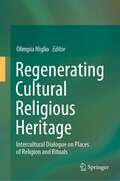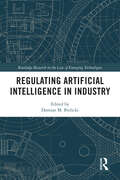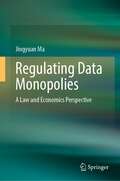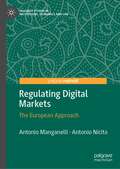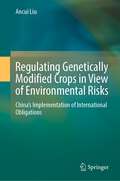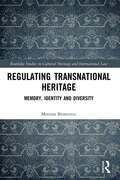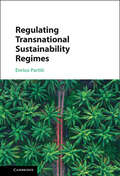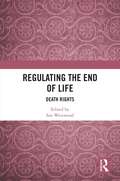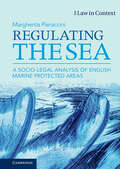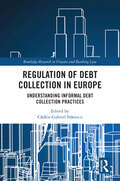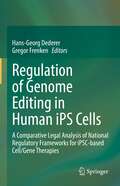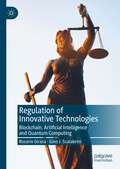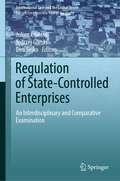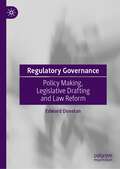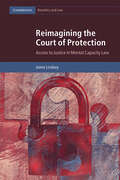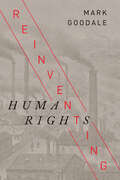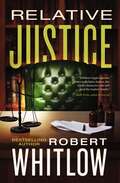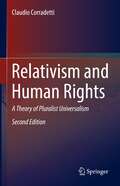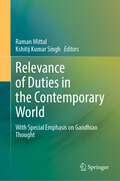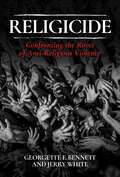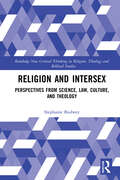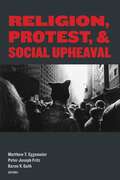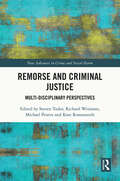- Table View
- List View
Regenerating Cultural Religious Heritage: Intercultural Dialogue on Places of Religion and Rituals
by Olimpia NiglioThis book introduces important reflections on understanding the meaning of cultural-religious heritage in an international context and their relationship with issues of sustainability at the local community level. Through a holistic approach, the book charts new courses in analyzing different cultural policies and methods for preserving and enhancing cultural heritage. Stemming from an intercultural seminar promoted by the International Scientific Committee Places of Religion and Ritual (ICOMOS PRERICO) under the theme of “Reuse and regenerations of cultural-religious heritage in the world: Comparison among cultures,” the book examines the scientific diplomacy and cultural strategies promoted by countries in dialogue with the UN 2030 Agenda, as well as Agenda 21 for Culture. The book seeks to reinforce the value of local cultural policies for supporting and enhancing cultural-religious heritage through specific programs and collaborations in dialogue with government policies. This collection is relevant to scholars working in areas relating to cultural heritage, religious heritage, architectural restoration, protection of the local inheritances, law, and management of the cultural sites.
Regulating Artificial Intelligence in Industry (Routledge Research in the Law of Emerging Technologies)
by Damian M. BielickiArtificial Intelligence (AI) has augmented human activities and unlocked opportunities for many sectors of the economy. It is used for data management and analysis, decision making, and many other aspects. As with most rapidly advancing technologies, law is often playing a catch up role so the study of how law interacts with AI is more critical now than ever before. This book provides a detailed qualitative exploration into regulatory aspects of AI in industry. Offering a unique focus on current practice and existing trends in a wide range of industries where AI plays an increasingly important role, the work contains legal and technical analysis performed by 15 researchers and practitioners from different institutions around the world to provide an overview of how AI is being used and regulated across a wide range of sectors, including aviation, energy, government, healthcare, legal, maritime, military, music, and others. It addresses the broad range of aspects, including privacy, liability, transparency, justice, and others, from the perspective of different jurisdictions. Including a discussion of the role of AI in industry during the Covid-19 pandemic, the chapters also offer a set of recommendations for optimal regulatory interventions. Therefore, this book will be of interest to academics, students and practitioners interested in technological and regulatory aspects of AI.
Regulating Data Monopolies: A Law and Economics Perspective
by Jingyuan MaThis book analyzes the business model of enterprises in the digital economy by taking an economic and comparative perspective. The aim of this book is to conduct an in-depth analysis of the anti-competitive behavior of companies who monopolize data, and put forward the necessity of regulating data monopoly by exploring the causes and characteristics of their anti-competitive behavior. It studies four aspects of the differences between data monopoly and traditional monopolistic behavior, namely defining the relevant market for data monopolies, the entry barrier, the problem of determining the dominant position of data monopoly, and the influence on consumer welfare. It points out the limitations of traditional regulatory tools and discusses how new regulatory methods could be developed within the competition legal framework to restrict data monopolies. It proposes how economic analytical tools used in traditional anti-monopoly law are facing challenges and how competition enforcement agencies could adjust regulatory methods to deal with new anti-competitive behavior by data monopolies.
Regulating Digital Markets: The European Approach (Palgrave Studies in Institutions, Economics and Law)
by Antonio Nicita Antonio ManganelliThis book illustrates the challenges that regulators and policy makers have faced in the transition from the ‘old’ network industries to the new digital ecosystem. It succinctly describes the evolution of digital economy, its main actors, notably global digital platforms, as well as its interactions, interdependences, and trade-offs. Eventually, it proposes insights about why public rules are needed, what kind of rules could be more effective, fair, and efficient, and who should pose and enforce them. The book is opened by an introduction, dealing with Digital Transformation, Big Techs, and Public Policies, which provides a general conceptual and thematic framework to the following analysis but could be also read as a stand-alone paper. The following chapters are grouped in two parts: I. The Evolution of Digital Markets and Digital Rights, and II. Regulating Big Tech’s Impact on Market and Society. The secondary title - the European approach – has a twofold meaning. It highlights the fact that this work has a clear focus on EU law and policy - although the economic and institutional issues addressed are global phenomena, common to all world’s economies. In addition, it also underlines that European digital policy is not yet complete and effective. This book intends to provide a small contribution to the ongoing policy making process, as well as to the wider academic and policy debate.
Regulating Genetically Modified Crops in View of Environmental Risks: China’s Implementation of International Obligations
by Ancui LiuThis book analyzes international and Chinese regulatory approaches addressing environmental risks that may be caused by GM crops and examines how China implements its international obligations in its policies and laws. Using the legal doctrinal method, the book discusses the precautionary principle and the public involvement principle, as well as several legal measures at the international law level and in Chinese law. It observes that legal principles and measures as provided for in China’s GMO legal framework have generally implemented the international obligations regarding the prevention of environmental risks that may be caused by the cultivation of GM crops and related activities. However, the book argues that Chinese law lacks an explicit codification of the precautionary principle, and the same is true with regard to public participation; the regulatory framework lacks specific obligations. It concludes that future research should focus on the application and enforcement of the relevant Chinese legislation, and that it is also important to investigate how the environmental risks that may be caused by new techniques, such as genome-editing techniques, could be prevented, given the experience gained by regulating the cultivation of GM crops and related activities.
Regulating Transnational Heritage: Memory, Identity and Diversity (Routledge Studies in Cultural Heritage and International Law)
by Merima BruncevicThere is a vast body of international and national law that regulates cultural heritage. However, the current regulation remains quite blind to the so called "transnational heritage". This is heritage where there is no community recognized in law that it can be directly attributed to and that can be responsible for its safekeeping and preservation. It can also be items of heritage where the claim of ownership is disputed between two or more peoples or communities. Transnational heritage challenges the idea of monolithic, mono-cultural, ethno-national states. There are a number of examples of such cultural heritage, for instance the Buddhist Bamiyan statutes in Afghanistan, Palmyra in Syria, the Jewish heritage of Iraq, or various items that are currently housed in large, often Western, museums, as a result of colonial practices. This book explores the regulation of transnational heritage. By discussing many cases of transnational heritage and the problems that arise due to the lack of regulation the book analyses the manifestations of memories and constructions of communities through heritage. It focuses particularly on the concept of community. How are communities constructed in cultural heritage law and what falls outside of the definitions of community? The book underlines that the issues surrounding transnational heritage involve more than a communal right to culture. It is argued that transnational heritage also directly affects wider matters of law such as citizenship, human rights, sovereignty, as well as the movement of people and cultural goods.
Regulating Transnational Sustainability Regimes
by Enrico PartitiThe book studies emergence and consolidation of voluntary sustainability standards (VSS); private standards defining sustainability-related product features. The book takes stock of their success and their potential in mediating between economic and non-economic concerns of global production. Despite their private and voluntary nature, VSS generate profound consequences for the producers seeking certification, for the consumers purchasing certified products, and for others affected by their standards. VSS are used by public authorities in the EU as a functional complement to public measures regulating global value chains. At this juncture of market proliferation and public use of private regimes, this book studies how public authority can control, coordinate and review VSS. It studies how the regulation of VSS could unfold through substantive and procedural legal requirements in the domain of European Union law and World Trade Organisation law, as well as through the incentives offered by VSS employment in public measures.
Regulating the End of Life: Death Rights
by Sue WestwoodDeath Rights is a collection of cutting-edge chapters on assisted dying and euthanasia, written by leading authors in the field. Providing an overview of current regulation on assisted dying and euthanasia, both in the UK and internationally, this book also addresses the associated debates on ethical, moral and rights issues. It considers whether, just as there is a right to life, there should also be a right to death, especially in the context of unbearable human suffering. The unintended consequences of prohibitions on assisted dying and euthanasia are explored, and the argument put forward that knowing one can choose when and how one dies can be life-extending, rather than life-limiting. Key critiques from feminist and disability studies are addressed. The overarching theme of the collection is that death is an embodied right which we should be entitled to exercise, with appropriate safeguards, as and when we choose. Making a novel contribution to the debate on assisted dying, this interdisciplinary book will appeal to those with relevant interests in law, socio-legal studies, applied ethics, medical ethics, politics, philosophy, and sociology.
Regulating the Sea: A Socio-Legal Analysis of English Marine Protected Areas (Law in Context)
by Margherita PieracciniThis book is the first ever written on English marine conservation regulation from a socio-legal perspective. The monograph presents an in-depth analysis of key aspects of Marine Protected Areas regulation in England, offering the reader access to an under-investigated field. Such regulatory mapping is complemented by an interdisciplinary treatment of the subject exploring the relationship between people and marine parks through central themes in environmental social sciences and regulatory theory, namely space, rationalisation, democracy and adaptation. Thus, the book is of interest to environmental lawyers and regulatory scholars but also to human geographers, environmental sociologists and political scientists. As the book provides critical reflections on current legal and regulatory structures, it contains valuable insights for policymakers and regulators. The book has a strong methodological basis drawing on in-depth desk-based research, complemented by primary qualitative research, conducted over a number of years.
Regulation of Debt Collection in Europe: Understanding Informal Debt Collection Practices (Routledge Research in Finance and Banking Law)
by Cătălin-Gabriel StănescuDue to the absence of due process and other procedural guarantees generally offered by judicial enforcement, informal debt collection practices (IDCPs) can become abusive, harming both consumers and the economy by threatening consumers’ physical, psychological, and economic wellbeing; exposing law-abiding debt collectors to unfair competition; undermining the financial system, and negatively impacting social peace by resorting to criminal activity. The need to control and harmonize IDCPs surfaced in connection with the European Commission’s Action Plan to tackle the high level of non-performing loans caused by the financial crisis and the Covid-19 pandemic - specifically the Proposal for a Directive on Credit Servicers, Credit Purchasers, and the Recovery of Collateral (CSD). Harmonizing the regulation of abusive IDCPs is vital for several reasons. First, IDCPs have a cross-border dimension due to the freedom of movement, enabling debt collection operations across the internal market. Second, the internal market’s size amounts to over 450 million citizens potentially exposed to abusive IDCPs. The regulatory frameworks addressing IDCPs in the EU display divergent characteristics that may be difficult to navigate and require creating a level-playing field for consumers and debt collectors, especially when approaches vary at Member State level. This book addresses this gap by providing a comprehensive guide to regulating informal debt collection practices in eight Member States (MS) of the EU and the United Kingdom (UK). It serves as a comparative law instrument for implementing the recently adopted Credit Servicers Directive (CSD). It will be important reading for students, academics and stakeholders with an interest in debt collection practices and the law.
Regulation of Genome Editing in Human iPS Cells: A Comparative Legal Analysis of National Regulatory Frameworks for iPSC-based Cell/Gene Therapies
by Hans-Georg Dederer Gregor FrenkenThe book provides a concise overview of currently applicable regulatory frameworks of states which are among the world leaders in research and development (R&D) of cell and gene therapies. Developments in genome editing are expected to lead to new possibilities for the treatment of hereditary diseases in humans. The treatment of such often severe but hitherto uncurable diseases can be based on genome-edited induced pluripotent stem cells (iPS cells). Such treatments constitute combined cell/gene therapies. These therapies need to be governed by a regulatory framework which ensures quality, safety, and efficacy of the relevant therapeutic products. On the other hand, such regulations may retard product approval and impede R&D. Accordingly, national regulations for therapies based on genome-edited iPS cells are an important and, as the case may be, decisive factor for both researchers and industry regarding their decision where to locate their R&D activities. Therefore, regulatory frameworks impact significantly on the competitiveness of states and their economies. This is why a comparative analysis of laws and regulations of different countries matters. Such a comparative legal analysis provides an important insight into regulatory concepts which, in turn, may inspire adjustments of, or amendments to, domestic legal regimes. For this purpose, experts present country reports on France, Germany, Japan, South Korea, Switzerland, and the USA. The reports on France and Germany also refer to the parameters and implications arising from pertinent EU law. This contributed volume is aimed at researchers, but also at, e.g., legal scholars, lawmakers, regulators, and political decision makers.
Regulation of Innovative Technologies: Blockchain, Artificial Intelligence and Quantum Computing
by Rosario Girasa Gino J. ScalabriniThis book explores the regulation of emerging technologies. Developments such as bitcoin (based on blockchain technology), artificial intelligence, quantum computing, and other technical advances have the potential to revolutionize many aspects of everyday life. As with other significant occurrences, especially when coupled by financial rewards, there are the inevitable attempts to reap gains unlawfully. This book examines the legal and regulatory enactments that attempt to undermine the risks to society as well as the dangers to individual freedoms that the technologies present when abused by governmental and non-governmental authorities. Included are discussions of the dangers to the right of privacy posed by facial recognition, physical location tracking, automated license plate recognition (ALPR) and other evolving applications of technology. This book is an invaluable resource for those interested in the regulation of emerging technologies particularly as they relate to blockchain, artificial intelligence, and the most current advances in quantum computing. Emphasis is focused on invasion of privacy, particularly by government authorities, antitrust implications of private companies and the efforts of international entities to counter alleged abuses by them.
Regulation of State-Controlled Enterprises: An Interdisciplinary and Comparative Examination (International Law and the Global South)
by Julien Chaisse Jędrzej Górski Dini SejkoThis book analyses actual and potential normative (whether legislative or contractual) conflicts and complex transnational disputes related to state-controlled enterprises (SCEs) operations and how they are interwoven with the problem of foreign direct investment. Moreover, SCEs also fall within the remit of international political economy, international economics and other SCE-related fields that go beyond purely legal or regulatory matters. In this connection, research on such economic and political determinants of SCE’s operations greatly informs and supplements the state of knowledge on how to best regulate cross-border aspects of SCE’s and is also be covered in this book. The book also aims to analyse the “SCE phenomenon” which includes a wide panoply of entities that have various structures with different degrees of control by states at the central or regional level, and that critically discuss the above-mentioned overlapping legal economic and political systems which can emerge under various shades of shadows casted by governmental umbrellas (i.e., the control can be exercised through ownership, right to appoint the management, and special-voting-rights). The chapters in this book are grouped, so as to address cross-border investment by and in SCE, into four coherent major parts, namely --- (i) the regulatory framework of state capitalism: laws, treaties, and contracts; (ii) economic and institutional expansion of state capitalism; (iii) the accountability of state capitalism: exploring the forms of liabilities; and (iv) regional and country perspectives. Contributions address the core theme from a broad range of SCE and international economic regulations, including but not limited to competition law, WTO law, investment law, and financial/monetary law. They also cover the new emerging generation of Free Trade Agreements (EU-Vietnam FTA, EU China investment treaty, Regional Comprehensive Economic Partnership; and the coordination between treaty systems). The book is a valuable addition and companion for courses, such as international trade law, international law of foreign investment, transnational law, international and economic development, world politics, law of preferential trade agreements, international economics, and economics of development.
Regulatory Governance: Policy Making, Legislative Drafting and Law Reform
by Edward DonelanThis book describes how governments formulate policies, draft legislation, and manage stocks of legislation and how approaches to these tasks are converging. That convergence has developed over 30 years through the work by the OECD in its studies on regulatory reform and the work of other international organizations to improve regulatory management. The Institutions of the European Union and its member states, OECD member countries and a growing number of developing and transitional countries have developed a policy best described as ‘Better Regulation.’ That policy is characterized using regulatory impact assessment, improving public consultation, and reducing administrative burdens. The policy has brought improvements in legislative drafting and managing stocks of legislation. The book concludes with a description of the impact of information technology on governments and how the challenges posed by the Internet, globalization and pandemics are being met by new approaches to regulating to ensure its benefits exceed its costs.
Reimagining the Court of Protection: Access to Justice in Mental Capacity Law (Cambridge Bioethics and Law)
by Jaime LindseyAs one of the first researchers authorised to observe hearings and access court files at the Court of Protection, Jaime Lindsey offers an original account and analysis of the workings of this court. Using data collected with the approval from the senior judiciary of the Court of Protection and the Ministry of Justice, this innovative book combines empirical data with theoretical and normative analysis. It takes a socio-legal approach to understanding how the Mental Capacity Act operates in practice to achieve access to justice and situates current debates within an international context, showing how other jurisdictions have been guided by the United Nations Convention on the Rights of Persons with Disabilities. Furthering scholarship across several fields including access to justice, healthcare law and procedural justice theory, this is a timely and pioneering book that argues for a reimagining of the Court of Protection.
Reinventing Human Rights (Stanford Studies in Human Rights)
by Mark GoodaleA radical vision for the future of human rights as a fundamentally reconfigured framework for global justice. Reinventing Human Rights offers a bold argument: that only a radically reformulated approach to human rights will prove adequate to confront and overcome the most consequential global problems. Charting a new path—away from either common critiques of the various incapacities of the international human rights system or advocacy for the status quo—Mark Goodale offers a new vision for human rights as a basis for collective action and moral renewal. Goodale's proposition to reinvent human rights begins with a deep unpacking of human rights institutionalism and political theory in order to give priority to the "practice of human rights." Rather than a priori claims to universality, he calls for a working theory of human rights defined by "translocality," a conceptual and ethical grounding that invites people to form alliances beyond established boundaries of community, nation, race, or religious identity. This book will serve as both a concrete blueprint and source of inspiration for those who want to preserve human rights as a key framework for confronting our manifold contemporary challenges, yet who agree—for many different reasons—that to do so requires radical reappraisal, imaginative reconceptualization, and a willingness to reinvent human rights as a cross-cultural foundation for both empowerment and social action.
Relative Justice
by Robert WhitlowFor the attorneys at Cobb and Cobb, the pursuit of justice is about more than legal expertise; it&’s a family matter.David Cobb is not a typical lawyer—he&’s more interested in dispensing God&’s wisdom than pertinent legal advice. High-stakes litigation is way outside his comfort zone.For many years Zeke Caldwell has been concocting home remedies made from natural ingredients found in the coastal marshes near Wilmington, North Carolina. One of his remedies proved so effective that he patented it with the help of David&’s father. Now he suspects a big drug company has stolen his formula. What he doesn&’t know is that the theft has deeper, more evil roots.When Zeke asks David to help fight the drug company, David knows the suit is beyond his expertise and experience. But his sister-in-law, Katelyn Cobb, is a rising star attorney in a prestigious Washington, DC, law firm. The courtroom is her second home. Could she help? Would she even consider it?Life&’s circumstances compel the lawyers to face, not only patent piracy, but personal obstacles and struggles that threaten to rip apart the fabric of the family. The fight for Zeke requires all the relatives to unite for justice.Praise for Relative Justice:&“Robert Whitlow&’s legal expertise shines in Relative Justice, a story of patent infringement and illegal gains, but it&’s his characters who will steal the readers&’ hearts. Katelyn Martin-Cobbs, her husband Robbie, and his family face trials that allow them to heal old wounds and forge new bonds. Whitlow&’s fans are sure to enjoy going along for a memorable, roller-coaster ride.&”—Kelly Irvin, author of Trust MeStand-alone novelBook length: 111,000 wordsIncludes discussion questions for book clubs
Relativism and Human Rights: A Theory of Pluralist Universalism
by Claudio CorradettiThis is an innovative contribution to the philosophy of human rights. Considering both legal and philosophical scholarship, the views here bear an importance on the legitimacy of international politics and international law. As a result of more than 10 years of research, this revised edition engages with current debates through the help of new sections. Pluralistic universalism considers that, while formal filtering criteria constitute unavoidable requirements for the production of potentially valid arguments, the exemplarity of judgmental activity, in its turn, provides a pluralistic and retrospective reinterpretation for the fixity of such criteria. While speech formal standards grounds the thinnest possible presuppositions we can make as humans, the discursive exemplarity of judgments defends a notion of validity which is both contextually dependent and "subjectively universal". According to this approach, human rights principles are embedded within our linguistic argumentative practice. It is precisely from the intersubjective and dialogical relation among speakers that we come to reflect upon those same conditions of validity of our arguments. Once translated into national and regional constitutional norms, the discursive validity of exemplar judgments postulates the philosophical necessity for an ideal of legal-constitutional pluralism, challenging all those attempts trying to frustrate both horizontal (state to state) and vertical (supra-national-state-social) on-going debates on human rights.On the first edition of this book: “Claudio Corradetti’s book is a thoughtful attempt to find an adequate theoretical foundation for human rights. Its approach is interdisciplinary in nature, drawing on issues in analytical philosophy as well as contemporary political theorists, and the result is a densely argued text aimed at scholars … .” (Andrew Lambert, Metapsychology Online Reviews, Vol. 14 (3), January, 2010)
Relevance of Duties in the Contemporary World: With Special Emphasis on Gandhian Thought
by Kshitij Kumar Singh Raman MittalThis book reflects on the significance of duties in creating an egalitarian society by collating and contextualizing the relevant literature. It particularly focuses on an appreciation of Gandhi’s views on duty to showcase how they remain pertinent to create a cohesive, responsible and value-based society in the present right-dominated world. A viable solution to the current real world problems could be found in exploring the philosophy on duties and the book provides relevant literature in this regard. It undertakes jurisprudential analysis of duty in a rights-dominated world, identifying the gaps in realising the potential of duty to address the critical issues of the present times. It argues that enforcement of rights depends heavily on the observance of duties and proposes coherence in right-duty relationship. Gandhian thought on duty recognises duty as a precursor to rights and emphasises that the observance of duties guarantees the enforcement of rights. The relevance of duties and Gandhian thoughts on the same is not restricted to India but transcends borders with profound appeal. Gandhian thoughts have become even more relevant in the current times to examine the situation of COVID-19 pandemic, racial discrimination (BLM), environmental crises, digital divide, health care and medical care crises, refugee and migrant labour problems and it can offer promising solutions based on the nuances of social solidarity, self realisation of duties/responsibilities, local governance, compassion and humanity.
Religicide: Confronting the Roots of Anti-Religious Violence
by Jerry White Georgette F. BennettA brave and timely proposal to name, investigate, and ultimately stop a new crime–the mass murder of millions of people for their faith.eligion-related violence is the fastest spreading type of violence worldwide. Attacks on religious minorities follow a clear pattern and are preceded with early warning signs. Until now, such violence had no name, let alone a set of policies designed to identify and prevent it. A unique attempt to create a new moral and legal category alongside other forms of persecution and mass murder, Religicide explores the roots of atrocities such as the Armenian Genocide, the Holocaust, the Bosnian war, and other human rights catastrophes. The authors tap into their decades of activism, interreligious engagement, and people-to-people diplomacy to delve into a gripping examination of contemporary religicides: the Yazidis in Iraq, the Rohingya in Myanmar, Uyghur Muslims and Tibetan Buddhists in China, and the centuries-long efforts to wipe out Indigenous Americans. Yet, even in the face of these horrific atrocities, the authors resist despair. They amplify the voices of survivors and offer a blueprint for action, calling on government, business, civil society, and religious leaders to join in a global campaign to protect religious minorities.
Religion and Intersex: Perspectives from Science, Law, Culture, and Theology (Routledge New Critical Thinking in Religion, Theology and Biblical Studies)
by Stephanie A. BudweyThis book considers the situation of intersex people who have faced erasure in the areas of science, law, culture, and theology due to the assumption that all humans are either ‘female’ or ‘male.’ Centered in interviews conducted with German intersex Christians, this book argues that moving from a paradigm of sexual dimorphism to sexual polymorphism will help promote the full humanity and flourishing of intersex people by creating a world where intersex individuals are no longer coerced and/or forced to undergo non-consensual, medically unnecessary treatment, no longer experience human rights violations because of their lack of legal protection, no longer feel inhuman and Other due to epistemic injustice that stems from socio-cultural norms and stereotypes, are no longer told they are not made in God’s image as a result of a sexually dimorphic understanding of Genesis 1:27, and no longer feel excluded and invisible in worship services that do not recognize them. This combination of the practical and the spiritual allows for a reconsideration of the medical treatment and pastoral care that should be available to intersex people. This book will be helpful to those in the disciplines of science, law, culture, and theology, particularly those in gender and theological studies and those already in and studying for lay and ordained ministry.
Religion, Protest, and Social Upheaval
by Matthew T. Eggemeier, Peter Joseph Fritz, and Karen V. GuthRepresents some of the best, cutting-edge thinking available on multiple forms of social upheaval and related grassroots movements.From the January 2017 Women’s March to the August 2017 events in Charlottesville and the 2020 protests for racial justice in the wake of George Floyd’s murder, social upheaval and protest have loomed large in the United States in recent years. The varied, sometimes conflicting role of religious believers, communities, and institutions in such events and movements calls for scholarly analysis. Arising from a conference held at the College of the Holy Cross in November 2017, Religion, Protest, and Social Upheaval gathers contributions from ten scholars in religious studies, theology and ethics, and gender studies—from seasoned experts to emerging voices—to illuminate this tumultuous era of history and the complex landscape of social action for economic, racial, political, and sexual and gender justice.The contributors consider the history of resistance to racial capitalist imperialism from W. E. B. Du Bois to today; the theological genealogy of the capitalist economic order, and Catholic theology’s growing concern with climate change; affect theory and the rise of white nationalism, theological aesthetics, and solidarity with migrants; differing U.S. Christian churches’ responses to the “revolutionary aesthetics” of the Black Lives Matter movement; Muslim migration and the postsecular character of Muslim labor organizing in the United States; shifts in moral reasoning and religiosity among U.S. women’s movements from the 1960s to today; and the intersection of heresy discourse and struggles for LGBTQ+ equality among Korean and Korean-American Protestants. With this pluralistic approach, Religion, Protest, and Social Upheaval offers a snapshot of scholarly religious responses to the crises and promises of the late 2010s and early 2020s. Representing the diverse coalitions of the religious left, it provides groundbreaking analysis, charts trajectories for further study and action, and offers visions for a more hopeful future.
Religious Transnationalism and Climate Change: The Role of Non-State Actors (Human Rights Interventions)
by Samadia SadouniThis book examines the role of religious actors in the field of climate change and especially in the international mobilization and negotiations to address the issue. It analyzes the mode of action and their discourses on multilateral platforms such as the United Nations Framework Convention on Climate Change (UNFCCC). The international Climate Change Framework Convention is primarily a process that can best be understood by analyzing the various steps taken by the international community, and specifically by different religious groupings, here, in the project manuscript, mainly Christians but also Muslims and Buddhists, in raising environmental consciousness through their programs. The interfaith dimension also plays a major role and needs to be studied in terms of the international realm of international liberal theories based on reciprocity, interdependence and cooperation but also within the framework of Sustainable Development Goals.
Remaking the American Dream: The Informal and Formal Transformation of Single-Family Housing Cities (Urban and Industrial Environments)
by Vinit MukhijaThe redefinition of the single-family house, the urban landscape, and the American Dream.Sitting squarely at the center of the American Dream, the detached single-family home has long been the basic building block of most US cities. In Remaking the American Dream, Vinit Mukhija considers how this is changing, in both the American psyche and the urban landscape.In defiance of long-held norms and standards, single-family housing is slowly but significantly transforming through incremental additions of second and third units. Drawing on empirical evidence of informal and formal changes, Remaking the American Dream documents homeowners&’ quiet unpermitted modifications, conversions, and workarounds, as well as gradual institutional alterations to once-rigid local land-use regulations. Mukhija&’s primary case study is Los Angeles and the role played by the State of California—findings he contrasts with the experience of other cities including Santa Cruz, Seattle, Portland, Minneapolis, and Vancouver. In each instance, he shows how, and asks why, homeowners are adapting their homes and governments are changing the rules that regulate single-family housing to allow for accessory dwelling units (ADUs) or second units.Key to Mukhija&’s research is the question of why the idea of single-family living is changing and what this means for the future of US cities. The answer, this book suggests, heralds nothing less than a redefinition of American urbanism—and the American Dream.
Remorse and Criminal Justice: Multi-Disciplinary Perspectives (New Advances in Crime and Social Harm)
by Richard Weisman Michael Proeve Steven Tudor Kate RossmanithThis multidisciplinary collection brings together original contributions to present the best of current thinking about the nature and place of remorse in the context of criminal justice. Despite the wide-spread and long-standing nature of interest in offender remorse, the topic has until recently been peripheral in academic studies. The authors are scholars from North America, the UK, Europe, South Africa and Australia, from diverse academic disciplines. They reflect on the role of remorse in law, for better or for worse, on how expressions of remorse are affected by the legal contexts in which they arise, and on the impact of these expressions on the individual, the court, and the community. The work is divided into four parts – Part I Judging Remorse addresses issues concerning the task of assessing remorse in the courtroom, usually prior to determining sentence. Part II Remorse Beyond the Courtroom explores the place and significance of remorse in various post-court settings. Part III Remorse, War and Social Trauma addresses remorse in the context of political violence and social trauma in the former Yugoslavia and South Africa. Finally, Part IV Reflections seeks to underscore the multidisciplinary and interdisciplinary nature of the collection as a whole, through personal and disciplinary reflections on remorse. The work provides a showcase for how diverse academic disciplines can be brought together through a focus on a common topic. As such, the collection will become a standard reference work for further research across a range of disciplines and promote inter-disciplinary dialogue.
